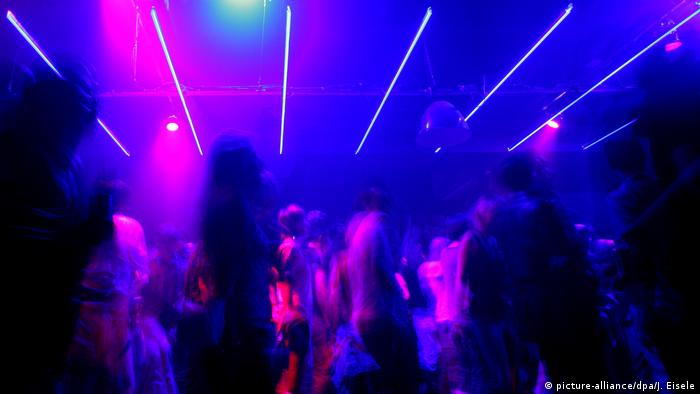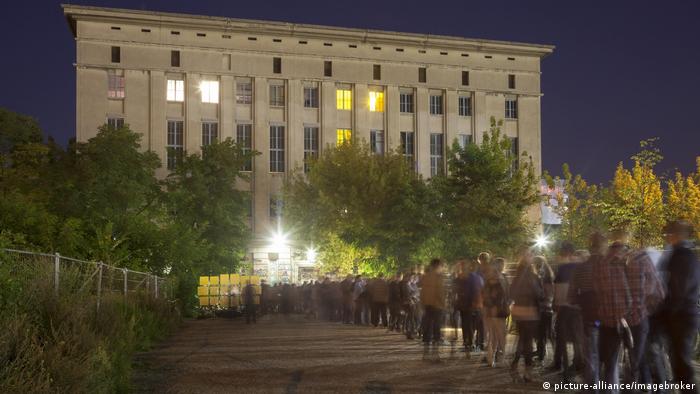Berlin is a Mecca of free and non-conformist Techno. But for how long? Large investors, gentrification and techno tourists to put the Clubs hard. And the policy is seemingly powerless.

How do they fit together? All the world raves about Berlin as the world capital of Techno. Every weekend, thousands of Techno Fans from all over the world in the Berlin Clubs. The mood at the parties regularly exceeds the boiling point. And yet this unique habitat is under threat like never before.
Burst the Techno-bubble?
Among those who raise their voice of warning, one of the world’s most distinguished DJs and Techno producers: Zak Khutoretsky, better known by his stage name DVS1. Khutoretsky is American with Russian roots and a second residence in Berlin, where he plays regularly at the Berghain, the Techno Club announced in Berlin. The word of DVS1 has weight in the international scene, some worship him as the “world conscience” of the Techno.

Techno DJ DVS1
DVS1, the Berlin Techno Community in a struggle for Survival: “At a certain point the bubble will burst,” he says. “Either you find a solution or the Whole thing goes down the drain.” The death blow could come from various directions: in Berlin at the Hype-to-fact, because the arrival of Techno-tourists destroy the character of the club? Or is it the Large international investors who came to the Clubs from their Locations to distribute? Is it the gentrification, with the priceless Rent go hand in hand? Or is it the actions of local residents due to noise nuisance, which the Clubs must in the end surrender?
Club die goes on
Of the 100 Berlin Techno estimated Clubs had to give up in the past year, four Clubs, confirmed the club Commission in Berlin, the Senate of the Deutsche Welle. A further nine Clubs are considered to be at risk. Including the semolina mill in the South of the city, founded by David Ciura eight years ago. The 30-Year-old can point to a proud record. It all started – typical for Berlin – with the desire of some people to celebrate undisturbed. The grounds of the semolina mill, a former pasta factory, seemed ideal.
Meanwhile, Ciura held 150 parties a year, employs 70 staff and has an annual turnover, the last of which 2.1 million Euro, continues upward steeply. Ciuras Techno parties, especially its monthly CockTail d’Amore, hit the nerve of even the very young techno fans.

He is one of the endangered Clubs in Berlin: the semolina mill in Berlin-Neukölln
But what hardly anyone knows: Ciura never gets more than half of the contracts. Planning security is different. Even now his lease has been extended back only to the beginning of 2020. And this is not an isolated case in Berlin. From the tradition of club vault, it is said, for example, that he received for a time only leases for a term of three months. “The long-term lease, you will not get in the inner ring at all,” complains Ciura and speaks of the ongoing “fear of being kicked out”. This could happen if an Investor would offer for the site of the semolina mill so much that the owner of the land sold.

David Cezar Ciura is the managing Director of Gries mill
The techno clubs have brought to Berlin from the sleeping beauty, says Ciura. “About 10 years ago, the node has burst. And now, after such a short period of time the zubuttern, would be a shame.” If it were up to him, would have to put the Berlin state government, the Senate, a Signal, and not only for prestige projects such as the 600-million-Euro reconstruction of the city Palace use.
However, politics have a lot to respond too late, writes culture Senator Klaus Lederer (die Linke) its predecessor and in an Interview with DW combative: “I think it is imperative to now fight for every square meter, for culture, for freedom in this city to fight for every Club.” But he admits that the policy against the concentrated Power of the billion investors can do little. After all, the soundproofing of the Senate supports the Clubs now with grants. However, this is to let the club die hardly stop.
A lot is at stake: Even Berlin is in the scene without controversy. The city is considered to be unique and alive: not only because of its legendary Clubs such as Berghain, Tresor or Watergate, but also because of the constant illegal start-UPS.
Techno = Freedom = Berlin

Established and unmatched: The Techno Club Berghain
These start-UPS are an expression of that freedom, for Berlin up to today. “In Berlin you can be as free as nowhere else in the world,” says as David Ciura. And DVS1 adds: “It’s about the freedom of the people to feel the way you want to escape from their office jobs to open up, and simply to enjoy your life.” He, however, also means freedom of the DJ’s to play their Sets without commercial constraints.
This goes on in Berghain, the world famous Techno temple, of course, anything other than “Underground”. “I think the Berghain tried as well as I, to protect the Aesthetics of the Underground, says DVS1. “No cameras, on the inside, complete freedom of the people, the freedom for the artists to play longer Sets.” And he mentions, in this connection, the dreaded bouncers, which have been denied to some visitors access to the Club. The strict “door policy” was necessary in order to preserve the Underground nature of the Berghain.
Hardly a Berlin Club is so unchallenged, such as the Berghain. Most of the other it will show up, whether you can claim in spite of the many threats to its character and economic existence. “From the Sexiness of what is being lost here and there a little,” sees culture Senator Lederer. But he do hope, however, that Berlin is not a glass concrete metropolis, like many other large European cities will.
Also, DVS1 has not given up his hope that Berlin will remain the capital of a free, non-conformist Techno: “If there is somewhere in the world a Chance to survive here, then in Berlin.”